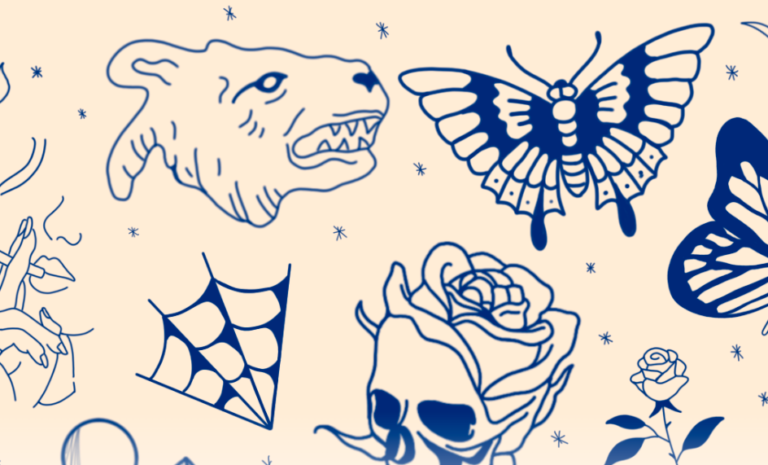
Content Warning: This article references self-harm and eating disorders.
This article is a finalist in the 2021 DC Student Arts Journalism Competition. Click here to learn more about the competition.
In the Colorado mountain town where I lived, tattoos were just part of the culture. Whenever things lagged at work, a circle of 30-somethings would trade tales and roll up sleeves to reveal panoramas of ink. Some shared moving stories of mental health struggles or the death of a loved one, others simply said, “Idk, I just thought it was beautiful.”
It was an electric and freeing environment that never took itself too seriously— yes, tattoos can be deeply meaningful, but they’re also just objectively cool. They are uniquely expressive and aesthetically alluring, with a hint of badass. They can’t be contained within their original meaning or lines, but stretch and move with their individual canvas.
“It’s not only something on a page or a wall, it’s a living, breathing thing that changes over the years,” Egan Barnitt (NHS ’22) said. “It takes on many different meanings and many different forms, it’s like pretty much the most interactive art form that you can really make.”
When I got my first tattoo, the artist cleaned the blood off my skin with the words, “Welcome to the inked community.” Colorado’s tattoo-embracing culture is worlds different from the stuffy professional atmosphere of Georgetown, but a small and diverse group of students make up a community of the decorated and proud.
Barnitt comes from the perspective of both the inked and the inker. She began her tattoo business in a New South dorm room her first year at Georgetown, giving stick-and-poke tattoos to fellow students. Over the years, she developed her talent, now offering hand-poked tattoos that look the equivalent of machine done artwork. “Being able to do tattoos has been such a confidence boost to know that people trust me and like my art enough to want it on them forever,” she said. “What more validation could you get than somebody being like, ‘I want it for the rest of my life?’”
For artists like Barnitt, tattooing offers artistic experimentation in movement, style, and color. While American style (think stereotypical biker tattoos) has emerged as a contemporary form, tattoo art has deep cultural origins and significance in Polynesia, South East Asia, and Indigenous North American societies, each of which have distinctive artistic elements. With skin and ink as the essential materials, modern artists can integrate history with new technology and play with styles, from the delicate to the abstract to the cartoonish.
For Barnitt, the act of tattooing itself is “meditative.” Tattooing can be a vulnerable process, so she strives to create a safe space for women and nonbinary people where their choices are respected. “That’s what really matters the most to me—being able to make sure that people feel safe while they’re making such large steps to become the person that they want to be,” Barnitt said.
Tattooing can offer people a renewed sense of agency over their bodies, and an ability to celebrate them in a unique format. “The best part about your body being your body is that it’s yours,” Ace Frazier (MSB ’23) said. “You can do anything you want whenever you want and that’s just so freeing and amazing.” Frazier is relatively spontaneous with tattoos, creating stick-and-pokes on their body whenever the inspiration for a design hits.
I empathize with the freedom tattooing can bring to your body. I entered 2020 with a long list of fears, and over the year, began intentionally facing each one (within reason). Getting inked commemorated the personal growth I’d made over my irrational thoughts and worries, and also marked the first time I’d ever felt confident in my body—not because of its appearance, but its strength. They can also act as reminders of personal growth. Akanksha Sinha (SFS ’23) began getting tattoos at the age of 16, and has gotten at least one every year as bookmarks of who she is then. “All my tattoos have meaning to them,” she said. “My first one was commemorating me being clean from self-harm for a year, so that was a really big deal.”
Since her first tattoo, Sinha uses her annual tattoos as a reminder of how far she’s come. “Every time I would feel the urge or anything I can look at that and be like, well I did it for so long, so I can do it for longer.”
For Barnitt, who has over 20 tattoos, tattooing has been a healthy way to have a say on her body’s appearance while recovering from an eating disorder. “I think being able to sort of reclaim your personhood in a visual way is really helpful.”
Last summer, Barnitt got a belly tattoo that she describes as one of her most empowering. “I thought, ‘I am over this. This tattoo is gonna look sick,’” she said. “I’m wearing crop tops all the time, because I want to show this off, you know, like I fucking love it.”
But part of the freedom of tattoos is that while they can have deep meaning, they’re also just freakin’ cool. As Barnitt said, “Sometimes stupid cool shit is really all that matters.” While there is pressure to get a tattoo with deep significance, every inked person I talked to unequivocally considered this mentality a misconception.
“There doesn’t need to be philosophy about you making a decision about your body or you making a decision in general,” Frazier said. “I really like that about tattoos.”
There is an often-cited worry about regretting tattoos, but Sinha knows that she won’t love all of her tattoos in every period of her life. And that’s okay. “People can get paralyzed by that idea of something being on your body forever,” she said.
Sinha sees her tattoos as time capsules, telling the story of who she was at different stages. “It’s okay if, 10 years down the line, they don’t mean the same thing to me, because there is still a reminder of what it meant to me then.”
If a tattoo is representative of who I am, then to me, its physical permanence isn’t a big deal. Just like our bodies, tattoos don’t need to be perfect. Permanent changes to our bodies will come whether we want them or not. Stretch marks from aging, crinkles from laughter, wrinkles from worry. Tattoos are selected snapshots in time of the people we were and the places we came from. And there’s something very honest and beautiful about that.
“I really like the idea that I’ll be able to look back on this one tattoo that maybe doesn’t mean much to me anymore, but to know that it meant enough to me at one point in my life to get it put on me permanently forever,” Barnitt said. “It’s just such an ode to all the people that I have been.”
Barnitt is a former cover editor of the Voice.

Sarah Watson is the Editor-in-Chief of The Georgetown Voice, Georgetown’s premier newsmagazine. She is a junior in Georgetown’s School of Foreign Service studying Regional and Comparative Studies. When she is not writing, she likes to be exploring the outdoors.